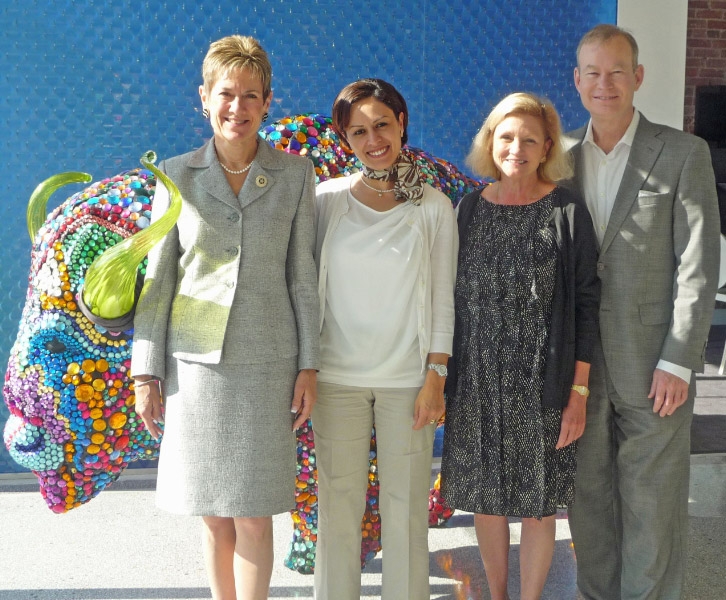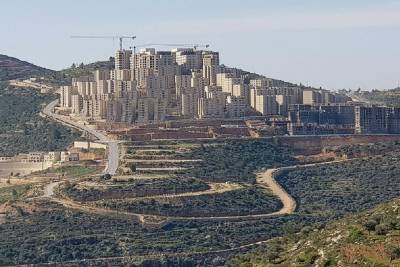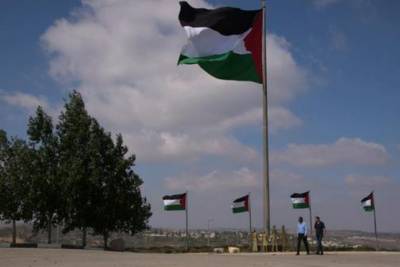Palestinian woman visits city to study urban development as part of Eisenhower Fellowship

The City Sentinel - Patrick B. McGuigan - On a hill in the West Bank, dreams of a city of affordable middle class housing are taking shape. Those dreams swirl around a major Palestinian construction project aimed at bringing into reality a planned community of homes and businesses centered around high-tech jobs, including service as an “out-sourcing” link to American and European enterprises.
Leading the “quality of life” segment of the project is Nisreen M. Shahin, currently in America as an Eisenhower Fellow. She visited Oklahoma City last week to study urban development and planning policies, meeting with members of the business community, the city council and Mayor Mick Cornett. Shahin’s local host was former state Rep. Laura Boyd, herself a Eisenhower fellow alumna who was recently inducted into the state Women’s Hall of Fame.
Shahin works with the Rawabi Foundation, based in Ramallah on the West Bank In a recent (March 21) story for Time magazine’s business section, reporter Stacy Perman described efforts to construct Rawabi as “the West Bank’s first planned community.” The project is the vision of Bashar Masri, managing director of an investment firm. Masri was born in the region, and comes from one of the most economically successful Palestinian families of recent history. He studied in Washington, D.C., and at Virginia Tech, and still has a home in Virgina, Perman reported..
The term Rawabi means “hills” in Arabic. The project is the largest construction project in modern Palestinian history.
Perman described Masri working at his office in Ramallah while watching progress in construction at the Rawabi site via a split-screen computer. His dream, and Shahin’s is for a 40,000-person middle class community that will lay a basis for future Palestinian economic development. From start to finish, program cost is projected at $850 million.
Shahin describes her hopes for “a high-tech, environmentally sustainable” community of the future, with housing stock aimed at college-educated professionals. That is a vital element to any hopeful future for her people. That dream of home ownership animates many in her generation of Palestinians.
The project has strong support from the Palestinian Authority and from the political party Fatah, which governs much of the West Bank. Israeli Prime Minister Benjamin Nethanyahu has endorsed Rawabi as an example of hopes for “an economic peace” between Israel and Palestinians. However, Shahin said approvals for the construction project remain bogged down.
Shahin is one of 30 Eisenhower Fellows now in the Untied States. The program began with a large group meeting in Philadelphia. From there, “fellows” dispersed around the nation, with Shahin traveling to Oklahoma City.
In addition to the practical knowledge she is gaining about big city economics and life, Shahin said she was “quite taken” with the people of Oklahoma City. She recalled that friends, including other Eisenhower Fellows, had claimed she was headed “to the middle of nowhere” when she began her journey to Oklahoma.
To the contrary, she said, “The people here are so interesting. There is so much culture and history, and the diversity has caught my attention.” In an interview with The City Sentinel, she reflected, “Your people are very welcoming, kind, and humble. The dark periods such as the bombing have united them, made them stronger.”
Shahin was impressed “with all the hard workers, who are so committed and united. There is a willingness to build, to improve your life.”
Eisenhower Fellowships honor the memory of the late President Dwight D. Eisenhower. The program entails four to five weeks, allowing the participants time for “personal and professional growth,” networking and, organizers say, “the exchange of ideas.” Both Americans and people from around the world (“Multi Nation Fellows”) participate.
The Eisenhower Fellowship website said Shaheen plans to build on her planning studies, “aligning educational efforts with private sector needs; and best practices of U.S. foundations.”
Councilwoman Salyer sat in on the interview with Shahin, along with Rep. Boyd. Salyer observed Oklahoma City had undergone “a paradigm shift” over the last two decades, making decisions “to invest in ourselves.” Salyer told Shahin the process of “involving everybody” in debate, and voter decisions on downtown and city developments has been challenging, but ultimately rewarding.
Asked for the meaning of her name in Arabic, Shahin said “Nisreen” was popularized some years ago in an Arabic song beloved in her family, including her grandfather.
Nisreen means “white flowers” – perhaps of the sort that will, one day, bloom atop that hill at Rawabi.
To view original article, Click Here.



